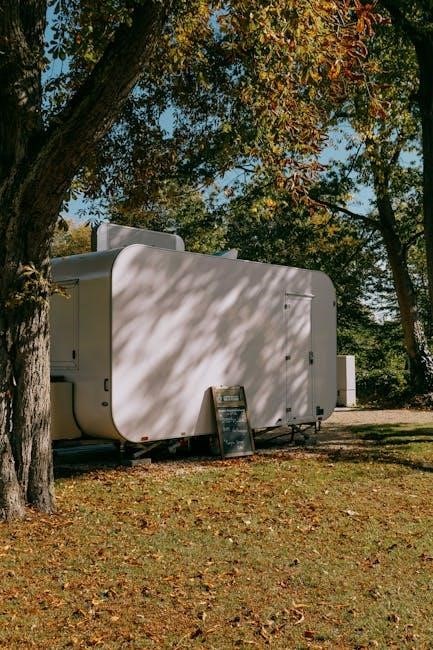The New Jersey Trailer Bill of Sale is a legal document that facilitates the transfer of trailer ownership. It ensures transparency‚ protects both parties‚ and serves as proof of the transaction‚ making it essential for a smooth process.

What Is a New Jersey Trailer Bill of Sale?
A New Jersey Trailer Bill of Sale is a legal document that records the transfer of ownership of a trailer‚ detailing buyer and seller information‚ trailer specifications‚ and sale terms‚ serving as proof of the transaction.

Key Elements of the Document
The New Jersey Trailer Bill of Sale includes essential details to validate the transaction. It requires the full names and addresses of both the buyer and seller‚ along with a detailed description of the trailer‚ including its make‚ model‚ year‚ and Vehicle Identification Number (VIN). The sale price must be clearly stated‚ along with the payment method and terms. Signatures from both parties are mandatory to confirm mutual agreement. The document also includes a section for notarization‚ which‚ while optional‚ adds an extra layer of authenticity. Additionally‚ the form may outline any warranties or conditions‚ such as an “as-is” sale‚ to protect both parties. Finally‚ the date of the sale is recorded to ensure the transaction is time-stamped. These elements collectively ensure the document’s legality and clarity‚ making it a comprehensive record of the trailer’s ownership transfer.

Why Is It Important for Trailer Transactions?
The New Jersey Trailer Bill of Sale is crucial for ensuring a legitimate and secure transfer of ownership. It serves as formal proof of the transaction‚ protecting both the buyer and seller by providing a clear record of the sale. This document is essential for registering and titling the trailer with the New Jersey Department of Motor Vehicles (DMV)‚ as it verifies the change in ownership. Without it‚ the buyer may face legal complications when attempting to register the trailer. Additionally‚ the Bill of Sale outlines the terms of the sale‚ including the price and any conditions‚ which helps prevent future disputes. It also ensures transparency‚ as both parties acknowledge the details of the agreement. In short‚ this document is indispensable for a smooth‚ legally binding trailer transaction in New Jersey.

How to Complete the NJ Trailer Bill of Sale Form
Complete the form by providing accurate buyer and seller details‚ trailer description‚ sale price‚ and terms. Ensure all sections are filled clearly and legibly‚ with signatures from both parties. Notarization is recommended for validity.
Step 1: Provide Buyer and Seller Information
Start by clearly stating the full legal names and addresses of both the buyer and seller. Include contact information‚ such as phone numbers‚ to ensure easy communication. Both parties must sign the document in the designated areas‚ with signatures serving as a legal acknowledgment of the transaction. Accurate identification details are crucial for validating the bill of sale and ensuring accountability. This step establishes a clear record of ownership transfer‚ protecting both parties from potential disputes. Ensure all information is printed legibly to avoid misunderstandings. This foundational step sets the stage for the rest of the document‚ confirming the identities of those involved in the trailer sale. Proper completion of this section is essential for the legal enforceability of the agreement. Avoid abbreviations or incomplete details to maintain clarity and professionalism.

Step 2: Describe the Trailer in Detail
In this section‚ provide a detailed description of the trailer to ensure clarity and avoid disputes. Include the trailer’s make‚ model‚ and year‚ if applicable. The Vehicle Identification Number (VIN) is critical and should be accurately recorded to verify the trailer’s identity. Note the trailer’s size‚ material‚ and type (e.g.‚ utility‚ cargo‚ or boat trailer). Mention any distinguishing features‚ such as color‚ axle count‚ or unique markings. If the trailer has been modified‚ describe the alterations; This level of detail helps prevent fraud and ensures both parties are in agreement about the item being sold. Accurate descriptions also aid in legal verification and registration processes. Be thorough and precise to avoid misunderstandings. Including photos or attaching additional documentation can further validate the description. This step ensures the trailer is clearly identified‚ protecting both buyer and seller in the transaction.
Step 3: Specify the Sale Price and Terms
Clearly stating the sale price and terms is essential for a valid and transparent transaction. Begin by writing the total purchase price in both numerical and written formats to avoid any confusion. Specify whether the price includes taxes or additional fees. Next‚ outline the payment terms‚ such as whether the buyer paid in full‚ made a deposit‚ or agreed to a payment plan. Include details about the payment method (e.g.‚ cash‚ check‚ or bank transfer) and provide receipts or proof of payment if applicable.
Additionally‚ note any conditions or agreements‚ such as whether the trailer is sold “as-is” or if warranties are included. Both the buyer and seller should initial or sign this section to confirm mutual agreement. This step ensures financial transparency and protects both parties by clarifying the terms of the sale.
Registering the Trailer in New Jersey
Visit the New Jersey Motor Vehicle Commission (NJ MVC) with the trailer bill of sale‚ proof of identity‚ and payment for registration fees. Trailers require titling and registration.
The Registration Process
To register a trailer in New Jersey‚ start by gathering necessary documents‚ including the completed NJ Trailer Bill of Sale PDF‚ proof of identity‚ and the trailer’s title if applicable. Visit a local New Jersey Motor Vehicle Commission (NJ MVC) office and submit these documents along with payment for registration fees. The MVC will process your application and issue a registration sticker and license plate for the trailer. Ensure all information is accurate to avoid delays. If the trailer is new or used‚ additional documentation like a manufacturer’s certificate of origin may be required. Once registered‚ you’ll receive the necessary credentials to legally operate the trailer in New Jersey. Be sure to check the NJ MVC website for any specific requirements or updates before your visit.
Documents Required for Registration
To register a trailer in New Jersey‚ specific documents must be submitted to the NJ MVC. First‚ a completed and signed New Jersey Trailer Bill of Sale PDF is mandatory‚ as it serves as proof of ownership transfer. Additionally‚ a valid government-issued ID for both the buyer and seller must be provided. If the trailer weighs over 2‚000 pounds‚ a title is required; otherwise‚ the bill of sale suffices. For new trailers‚ a manufacturer’s certificate of origin may also be needed. You’ll also need to complete an MVC-2 form‚ which is the trailer registration application. In some cases‚ a VIN verification might be required if the trailer was purchased from a private party. Ensure all documents are accurate and up-to-date to avoid delays in the registration process. For detailed requirements‚ visit the NJ MVC website or consult with local office representatives.

Legal Considerations
Legal considerations ensure the NJ trailer bill of sale complies with state laws‚ serving as a binding contract. It protects both parties by outlining ownership transfer and terms‚ requiring accurate documentation.
Warranty Disclaimers and As-Is Sales
Warranty disclaimers and as-is sales are critical components of the NJ trailer bill of sale‚ as they clarify the terms of the transaction. A warranty disclaimer indicates that the seller makes no guarantees about the trailer’s condition‚ functionality‚ or history. This protects the seller from future claims related to undisclosed defects. Conversely‚ an as-is sale means the buyer accepts the trailer in its current state‚ absolving the seller of liability for any issues discovered after the sale. These provisions are essential for minimizing legal disputes and ensuring transparency. However‚ sellers must still disclose any known defects‚ as failing to do so could lead to legal consequences. Buyers should carefully review these disclaimers and inspect the trailer thoroughly before signing the document. Balancing these aspects ensures a fair and legally sound transaction for both parties. Proper documentation of these terms in the bill of sale is vital for enforcement.
The Role of Notarization
Notarization plays a crucial role in the validity and enforceability of a New Jersey Trailer Bill of Sale. It ensures that the document is executed voluntarily and authentically‚ verifying the identities of both the buyer and seller. A certified public notary witnesses the signing of the document‚ confirming that all parties are entering the agreement knowingly and without coercion. This process adds a layer of legal protection‚ as it helps prevent fraud and disputes over the authenticity of the transaction. While notarization is not always legally required for a trailer bill of sale in New Jersey‚ it is highly recommended to safeguard both parties’ interests. A notarized document is more likely to hold up in court if legal issues arise. By involving a notary‚ the transaction gains credibility and provides a clear record of the sale‚ benefiting both buyers and sellers. This step is especially important for high-value or complex transactions.

Tips for Buyers and Sellers
- Buyers should verify the trailer’s VIN‚ title‚ and condition before purchase.
- Sellers must ensure all details are accurate to avoid disputes.
- Both parties should retain copies for their records.

What Buyers Should Know
When purchasing a trailer in New Jersey‚ buyers should carefully review the Trailer Bill of Sale to ensure all details are accurate. Verify the trailer’s Vehicle Identification Number (VIN)‚ make‚ model‚ and year to confirm it matches the description. Check for any existing liens or loans on the trailer‚ as the seller must disclose this information. Ensure the sale price and payment terms are clearly stated in the document. Buyers should also inspect the trailer for any damage or issues before finalizing the purchase. It’s important to request a notarized bill of sale‚ as this adds legal validity to the transaction. Finally‚ keep a copy of the document for your records‚ as it will be needed for registration. Understanding these steps helps buyers avoid potential disputes and ensures a smooth transfer of ownership.
What Sellers Should Know

When selling a trailer in New Jersey‚ sellers must ensure the Trailer Bill of Sale is completed accurately and thoroughly. Provide clear and correct information about yourself‚ including your name‚ address‚ and signature. Accurately describe the trailer‚ including its make‚ model‚ year‚ and VIN‚ to avoid disputes. Disclose any existing liens or loans on the trailer‚ as failing to do so can lead to legal issues. Clearly state the sale price and terms‚ such as whether the trailer is being sold “as-is” or with a warranty. Including a warranty disclaimer can protect you from future claims. Consider having the document notarized to add authenticity and prevent potential challenges. Keep a copy of the bill of sale for your records‚ as it serves as proof of the transaction. Ensuring transparency and completeness in the document helps protect both parties and ensures a smooth sale process.

